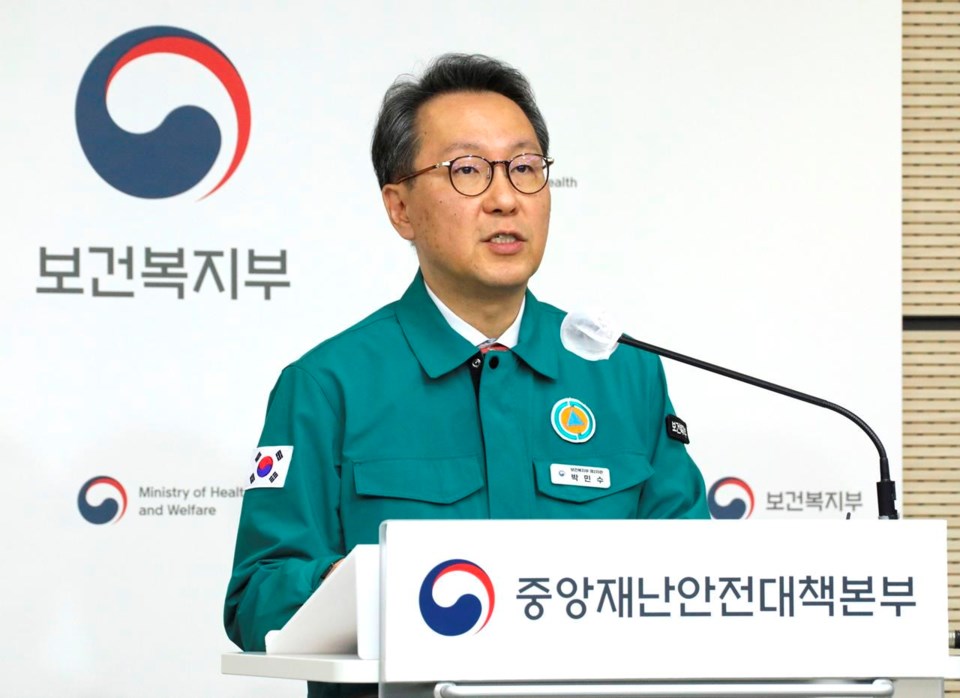SEOUL, South Korea (AP) — South Korea’s government will take final steps to suspend the licenses of striking junior doctors next week as they refuse to end their weekslong walkouts that have burdened the country’s medical services, officials said Thursday.
More than 90% of the country’s 13,000 medical interns and residents have been on strike for about a month to protest the government’s plan to sharply increase medical school admissions. Their strikes have caused hundreds of cancelled surgeries and other treatments at hospitals.
Officials say it is urgent to have more doctors because South Korea has a rapidly aging population and its doctor-to-population ratio is one of the lowest in the developed world. But doctors say schools can’t handle an abrupt, steep increase in students, and that it would ultimately undermine the country’s medical services.
The government has been taking a series of administrative steps required to suspend their licenses after they missed a government-set, Feb. 29 deadline to return to work. The steps include sending officials to formally confirm the absences of strikers, informing them of possible license suspensions and giving them chances to respond.
Vice Health Minister Park Min-soo told a briefing Thursday that the government is expected to complete those steps for some of the striking doctors next week and will send them notices about its final decision to suspend their licenses.
Park earlier said that under South Korea's medical law, the striking doctors could face at a minimum three-month suspensions and even indictments by prosecutors for refusing the government's back-to-work order.
He urged the striking doctors to return to work immediately, suggesting those who end their strikes could receive softer punishments.
“They should return as soon as possible not only for patients but also for their future careers. This kind of exhaustive walkout from hospitals must not continue any longer," Park said. “As we've said many times, we won't treat those who return swiftly as equally as those who return late.”
It's unclear whether and how many striking doctors would return to their hospitals at the last minute. According to Park, none of the strikers who were informed of their possible license suspension has responded.
Senior doctors at major university hospitals recently decided to submit resignations next week in support of the junior doctors. Still, most of them will likely continue to report to work. If they walk off the job, that would hurt South Korea’s medical services severely.
Two senior doctors, who lead an emergency doctors' committee for the walkouts, were recently given government notices that their licenses would be suspended for three months for allegedly inciting the junior doctors' walkouts.
The striking junior doctors account for less than 10% of South Korea’s 140,000 doctors. But in some major hospitals, they represent about 30%-40% of the doctors, assisting senior doctors during surgeries and dealing with inpatients while training.
The government aims to increase the country’s medical school enrollment cap by 2,000 starting next year, from the current cap of 3,058 that has been unchanged since 2006. On Wednesday, the government announced detailed plans on how to allocate those additional 2,000 admission seats to universities, a sign that it won't back down its plan.
Officials say more doctors are required to address a long-standing shortage of physicians in rural areas and in essential but low-paying specialties. But doctors say newly recruited students would also try to work in the capital region and in high-paying fields like plastic surgery and dermatology. They say the government plan would also result in doctors performing unnecessary treatments due to increased competition.
Surveys show that a majority of South Koreans support the government's push to create more doctors, with critics suspecting that doctors, one of the highest-paid professions in South Korea, worry about lower incomes due to the supply of more doctors.
Hyung-jin Kim, The Associated Press



